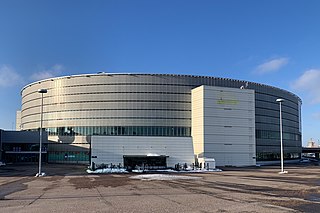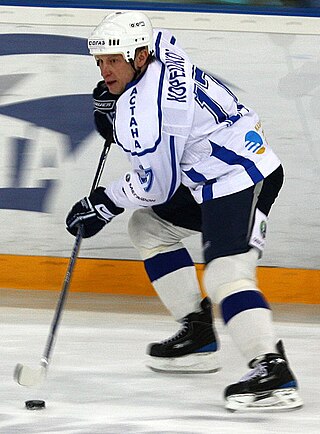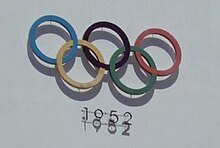
Bandy is a winter sport and ball sport played by two teams wearing ice skates on a large ice surface while using sticks to direct a ball into the opposing team's goal.

Helsinki is the capital and most populous city in Finland. It is on the shore of the Gulf of Finland and is the seat of southern Finland's Uusimaa region. About 685,000 people live in the municipality, with 1.3 million in the capital region and 1.61 million in the metropolitan area. As the most populous urban area in Finland, it is the country's most significant centre for politics, education, finance, culture, and research. Helsinki is 80 kilometres (50 mi) north of Tallinn, Estonia, 400 kilometres (250 mi) east of Stockholm, Sweden, and 300 kilometres (190 mi) west of Saint Petersburg, Russia. Helsinki has significant historical connections with these three cities.

The Winter Olympic Games, also known as the Winter Olympics, is a major international multi-sport event held once every four years for sports practiced on snow and ice. The first Winter Olympic Games, the 1924 Winter Olympics, were held in Chamonix, France. The modern Olympic Games were inspired by the ancient Olympic Games, which were held in Olympia, Greece, from 776 BCE to 394 CE. The Baron Pierre de Coubertin of France founded the International Olympic Committee (IOC) 1,500 years later in 1894, leading to the first modern Summer Olympic Games in Athens, Greece in 1896. The IOC is the governing body of the Olympic Movement, with the Olympic Charter defining its structure and authority. The original five Winter Olympic Sports were bobsleigh, curling, ice hockey, Nordic skiing, and skating. The Games were held every four years from 1924 to 1936, interrupted in 1940 and 1944 by World War II, and resumed in 1948. Until 1992, the Summer Olympic Games and the Winter Olympic Games were held in the same year. A decision to change this was made in 1986, when during the 91st International Olympic Committee session, IOC members decided to alternate the Summer Olympic Games and the Winter Olympic Games on separate four-year cycles in even-numbered years. Also, at that same congress it was decided that 1992 Winter Olympics would be the last to be held in the same year as the Summer Games and that to change the rotation, the games that would be held in 1996 would be brought forward by two years, being scheduled to 1994. After those games, the next were to be held in 1998 when the four-year Olympic Cycle resumed.

The 1952 Summer Olympics, officially known as the Games of the XV Olympiad and commonly known as Helsinki 1952, were an international multi-sport event held from 19 July to 3 August 1952 in Helsinki, Finland.

The 1952 Winter Olympics, officially known as the VI Olympic Winter Games and commonly known as Oslo 1952, were a winter multi-sport event held from 14 to 25 February 1952 in Oslo, the capital of Norway.
Sportin Latvia includes basketball, football, ice hockey, athletics (track), rugby, tennis, cycling, and others. Ice hockey is the most popular of the Latvian sports and is closely followed by basketball. Some of Latvia's most notable athletes include hockey player Sandis Ozoliņš, football player Māris Verpakovskis, Olympic javelin thrower Jānis Lūsis, two-time Olympic BMX champion Maris Strombergs, and basketball player Kristaps Porziņģis. The national sport of Latvia is ice hockey.

Helsinki Halli is a large multi-functional indoor arena located in Helsinki, Finland. It was opened in April 1997. The arena is convertible for various events. The total seated capacity during ice hockey games is 13,349 and as an amphitheatre, it is significantly reduced to between 3,000 to 5,000.

The Helsinki Olympic Stadium, located in the Töölö district about 2.3 kilometres (1.4 mi) from the centre of the Finnish capital Helsinki, is the largest stadium in the country. The stadium is best known for being the centre of activities in the 1952 Summer Olympics. During those games, it hosted athletics, equestrian show jumping, and the football finals.

Sport holds a central place in British culture, and the United Kingdom has played a key role in both the development and global spread of many sports. In the early stages of organized sport, the Home Nations were instrumental in establishing formal rules and forming some of the earliest governing bodies, national teams, and domestic league competitions.

Kazakhstan's former long-term President, Nursultan Nazarbayev, has challenged sports organizers to engage 30 percent of the country's population in sports. The state has numerous sports clubs where people participate in various types of sports; sport facilities are available to the general public. Kazakhstan currently hosts major international tournaments; Astana and Almaty hosted the VII Asian Winter Games 2011, which drew teams from 27 countries.
Sport is considered a national pastime in Finland and many Finns visit different sporting events regularly. Pesäpallo is the national sport of Finland, although the most popular forms of sport in terms of television viewers and media coverage are ice hockey and Formula One. In spectator attendance, harness racing comes right after ice hockey in popularity.

Finland first participated at the Olympic Games in 1908 and has sent athletes to compete in every Summer Olympic Games and every Winter Olympic Games since then. Finland was also the host nation for the 1952 Summer Olympics in Helsinki. Finnish athletes have won a total of 305 medals at the Summer Games, mostly in athletics and wrestling. Finland has also won 175 medals at the Winter Games, mostly in nordic skiing events.
Sport in Croatia has significant role in Croatian culture, and many local sports clubs as well as the Croatian national squads enjoy strong followings in the country. The most enduring sport by far in Croatia is football, and is played on amateur and professional levels amongst all age groups across the entire country. Several other major team sports are handball, basketball and water polo, with clubs in all parts of Croatia. Ice hockey is another popular team sport, namely in the Croatian interior. The most popular individual sports in Croatia are tennis, alpine skiing, and swimming, and to some extent table tennis and chess. Various amateur sport games are popular in Croatia, notably picigin.
Sports in Portugal are important in Portuguese culture. High-profile, successful competitive athleticism and sportsmanship in Portugal can be traced back to the time of ancient Rome. Gaius Appuleius Diocles was a noteworthy charioteer born in Lamego who became one of the most celebrated athletes in ancient history. He is often cited as the highest-paid athlete of all time. Football is the most popular sport in Portugal. Other than football, many other professional or semi-professional well organized sport competitions take place every season in Portugal, including basketball, swimming, athletics, tennis, gymnastics, futsal, rink hockey, team handball, volleyball, surfing, canoeing and rugby union championships among the hundreds of sports played in this country.

Sports play a significant part in the life of many Czechs who are generally loyal supporters of their favourite teams or individuals.

Helsinki Velodrome is an outdoor velodrome, American football and field hockey stadium in Helsinki, Finland. The protected functionalist concrete building was designed by Hilding Ekelund.

Karhu is a Dutch sports equipment company based on an originally Finnish brand, focused on running. Originally established as "Oy Urheilutarpeita" in 1916, it was renamed "Karhu" four years later. Karhu's line of products includes sneakers, t-shirts and jackets. In past years, Karhu also manufactured skis. In 2008, the company was sold to a group of investors organised under "Karhu Holding B.V.". The investors responsible for operations are Dutch/American businessman Huub Valkenburg and the Arese family from Italy. Karhu Holding B.V. is based in the Netherlands and is run by Emanuele Arese.

Kalervo Juhani Kummola is a Finnish ice hockey executive, businessman, and politician. He co-founded the hockey club Kiekko-67 at age 21, was later marketing director for HC Turun Palloseura, and chief executive officer of the SM-liiga. Becoming a board member of the Finnish Ice Hockey Association in 1975, he was elected vice-president in 1990, and served as president from 1997 to 2016. He helped organize multiple World Championships hosted in Finland, was an International Ice Hockey Federation (IIHF) vice-president from 2003 to 2021, and chairman of the Finnish Olympic Committee from 2005 to 2016.

Berlin is a major sporting centre in Germany and Europe. In 2013 around 600.000 Berliners were registered in more than 2.300 amateur sports- and fitness clubs.
Josef Fleischlinger was a Czechoslovak basketball coach and referee, an ice hockey referee, and a sports official.















